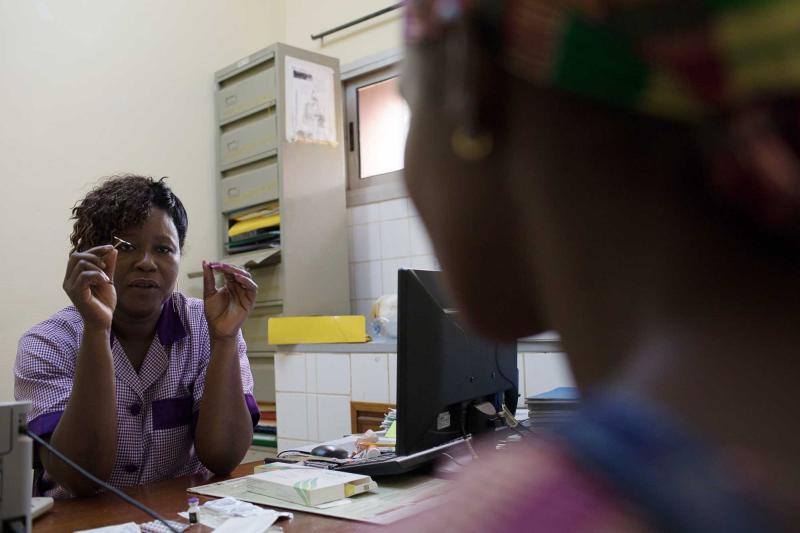Where We Work
See our interactive map


A health worker provides family planning counseling at Clinique ABBEF in Burkina Faso. During Family Planning Special Days, midwives and other health workers deliver educational talks, then women receive counseling and are offered the variety of family planning methods. Photo by Trevor Snapp for IntraHealth International.
A new article co-authored by IntraHealth International staff, “Increasing Contraceptive Use Through Free Family Planning Special Days in Poor Urban Areas in Francophone West Africa,” published in the journal Global Health: Science and Practice, highlights the impact of an initiative to encourage family planning uptake through a combination of free services, proximity, convenience, and awareness raising.
Read the free article here.
Geographic, financial, and social barriers continue to contribute to high unmet need for family planning in francophone West Africa. To address this challenge, municipalities and health systems are implementing Family Planning Special Days (FPSDs) with technical support from The Challenge Initiative (TCI), a “business unusual” platform led by the William H. Gates Sr. Institute for Population and Reproductive Health at the Johns Hopkins Bloomberg School of Public Health. TCI works to rapidly and sustainably expand proven reproductive health solutions among the urban poor.
IntraHealth leads the Francophone West Africa hub of TCI, and has helped cities in Benin, Burkina Faso, Côte d’Ivoire, Niger, Senegal, and Togo add over 380,000 family planning users in the past five years by scaling up family planning high-impact practices.
1,046 Family Planning Special Days were held at 452 health facilities in 10 cities.
Organized monthly or quarterly over 2-5 consecutive days in health facilities or community sites, FPSDs educate, inform, and mobilize the community for family planning while delivering free services. Midwives primarily conduct FPSDs, with community health workers, nurses, and doctors. Domestic resource mobilization through cities’ financial contributions, along with close collaboration between city-level management and coordination units and TCI focal points, are key components of the program that foster local ownership and sustainability.
The article analyzes 1,046 FPSDs held between July 2020 and June 2021 in 452 health facilities in 10 cities. In the 10 cities, 181,792 people were made aware of the FPSDs and 71,669 contraceptive users were served. Almost half (46%) of service users were adolescents and youth ages 15-24, who also represented 51% of the overall 58% of new users of contraception. Seventy-eight percent of the women of reproductive age who chose a method received free long-acting contraceptive methods. Cities contributed 35% of the overall cost of organizing the days (approximately US $252,839).
46% of family planning service users were adolescents and youth ages 15-24.
The impressive results should spur municipalities and health systems to institutionalize the FPSDs intervention by integrating it into national policies and increasing availability of contraceptives. The authors conclude, however, that municipalities must allocate more financial resources to the health system to ensure sustainability of FPSDs. Other challenges to sustainability include contraceptive stockouts and maintaining the continuity of family planning services during shocks to the health system such as the COVID-19 pandemic.
Current and former IntraHealth staff working on TCI who co-authored the article include Mamadou Kandji (lead author), Hawa Talla, René Jean Firmin Nakoulma, Sujata Naik Bijou, Cheikh Ibrahima Diop, Josephat Avoce, and Fatimata Sow.
The article is part of a special supplement of Global Health: Science and Practice published in May, Supporting Cities to Scale Access to Family Planning and Adolescent and Youth Reproductive Health Programming: The Challenge Initiative Platform. The issue also includes an article on IntraHealth’s work in Benin through TCI to improve the quality of family planning services for youth.



